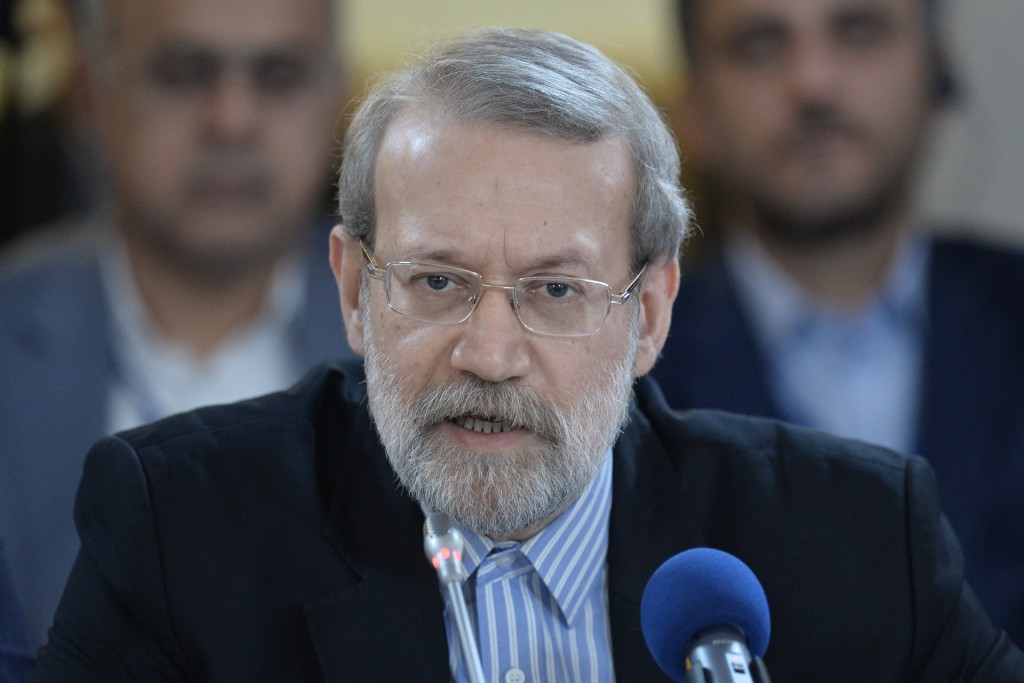North-South corridor important project for region, Iranian official

By Aynur Karimova
The project of North-South international transport corridor is of strategic importance for our region, Iran's Parliamentary Speaker Ali Larijani believes.
He said in his recent interview with Russian media on April 21 that this corridor can be profitable for all countries, including Russia, "which can get an access to the waters of the Persian and Oman Gulfs via this corridor."
"This route can help Russia with cargo transportation," he noted, adding that all countries located on this route will be able to benefit it.
"Therefore, it will be beneficial for Iran as well - we will be connected with Russia, with the countries that are located along this corridor, with Europe and China. Having an access to the Gulf of Oman will also be helpful for other countries. This is a strategic project for our region," Larijani stated.
The North-South corridor, from India to Helsinki, with a length of 5,000 kilometers is designed to carry more than 20 million tons per year. It is a multimodal route for transportation of passengers and cargo from Russia's St. Petersburg to the Mumbai port. It is designed to carry transit cargo from India, Iran and other Persian Gulf countries to the territory of Russia (the Caspian Sea) and further - to Northern and Western Europe.
The North-South route enjoys several advantages compared to other transport corridors; it is more profitable for each parameter than other alternative routes, such as the Suez Canal-the Mediterranean Sea-Northern Europe and the Turkmenistan-Kazakhstan-Russia-Northern Europe routes.
The preliminary estimates show that at an initial stage, it is planned to transport 6 million tons of cargo via the North-South corridor a year, and 15 to 20 million tons of cargo in the future.
Larijani went on to add that in all regional negotiations with Central and Middle Asia countries, Azerbaijan, and Russia, a special attention is paid to this important issue.
Economists say that cargoes, which come from China, can be directed to Northern Europe, and the goods from Western Europe - to Iran, that is, the North-South and East-West corridors actually combine.
In this case, Azerbaijan, with its favorable strategic and geographic location on the intersection major transport projects linking north with south and east with west, will become a hub, a logistics center of transit cargo transportation.
Sergei Stolyarov, the Head of International Cooperation Department of Russian railways JSC also considers Azerbaijan as an active initiator and driver of the North-South corridor.
He also stressed the importance of constructiing a railroad bridge over the Astara River on the border of the two countries, which was launched on April 20 with the participation of Azerbaijan's Economy and Industry Minister Shahin Mustafayev and Iran's Minister of Communications and Information Technology Mahmoud Vaezi.
"We hope that laying the foundation stone means that it will become a cornerstone for the active phase of implementation of the project on construction of the Rasht-Astara railway section," Stolyarov added. "This is the main element of the North-South corridor, and we hope that a direct connection between the countries of the Persian Gulf, South Asia and Iran through Azerbaijan to Russia and Europe will be created in the future, and we will be able to get effective transport links in the Eurasian region."
The railroad bridge over the Astara River is a strategically important facility that will connect the railways of Azerbaijan and Iran. The bridge will be constructed until late 2016.
In accordance with an agreement signed by Azerbaijan and Iran, the border bridge will be built jointly.
The length of the railroad bridge will reach 82.5 meters, while its width will amount to 10.6 meters.
The bridge will become an integral part of the Astara (Azerbaijan) - Astara (Iran) railway, which is part of the North-South international transport corridor.
Stolyarov believes that the foundation of the bridge in Astara testifies that Azerbaijan is an active initiator and drive of this project.
"In the future, implementation of the construction of the Rasht-Astara railway line will allow Azerbaijan to receive additional transit cargo base and to become a major participant in the North-South corridor, to attract additional cargoes to its territory and to receive additional income," he added.
The sections of the Qazvin-Rasht and Astara (Iran) - Astara (Azerbaijan) railway are under construction.
The Astara (Iran) - Astara (Azerbaijan) section is planned to be constructed in 2016, while the Qazvin-Rasht section in 2017. The Rasht-Astara railway will be under construction simultaneously.
Commenting on the possibility of establishing a consortium of the North-South corridor, Stolyarov said that the participants of the project have been for a long time a consistent supporter of the tripartite dialogue on the implementation of the project.
"Earlier, agreements on the revitalization of the project were repeatedly reached, various forms of its implementation were discussed, and we are currently discussing the possible forms its joint implementation with our partners in Azerbaijan and in Iran. Therefore, all are possible," he concluded.
--
Aynur Karimova is AzerNews’ staff journalist, follow her on Twitter @Aynur_Karimova
Follow us on Twitter @AzerNewsAz
Here we are to serve you with news right now. It does not cost much, but worth your attention.
Choose to support open, independent, quality journalism and subscribe on a monthly basis.
By subscribing to our online newspaper, you can have full digital access to all news, analysis, and much more.
You can also follow AzerNEWS on Twitter @AzerNewsAz or Facebook @AzerNewsNewspaper
Thank you!
